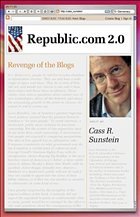What happens to democracy and free speech if people use the Internet to create echo chambers--to listen and speak only to the like-minded? What is the democratic benefit of the Internet's unlimited choices if citizens narrowly limit the information they receive, creating ever-smaller niches and fragmenting the shared public conversation on which democracy depends? Cass Sunstein first asked these questions before 9/11, in Republic.com , and they have become even more urgent in the years since.
Now, in Republic.com 2.0 , Sunstein thoroughly rethinks the critical relationship between democracy and the Internet in a world where partisan Web logs have emerged as a significant force in politics and where cyber-jihadists have embraced the Internet to thwart democracy and spread violence.
Emphasizing the value of unplanned, unchosen encounters, the original Republic.com provoked a strong reaction from cyber-optimists. In Republic.com 2.0 Sunstein answers the critics and expands his argument to take account of new developments, including the blogosphere, and fresh evidence about how people are using the Internet. He demonstrates that the real question is how to avoid "information cocoons" and to ensure that the unrestricted choices made possible by technology do not undermine democracy. Sunstein also proposes new remedies and reforms--focusing far less on what government should do, and much more on what consumers and producers should do--to help democracy avoid the perils, and realize the promise, of the Internet.
Review:
"Republic.com enraged many because it asked a set of uncomfortable questions that few had a way of answering. In this beautifully revised edition, Sunstein continues to press these difficult questions, not as an attack on new technologies but as a challenge to make them make democracy work. This is a compelling if sober set of questions from America's foremost legal scholar."--Lawrence Lessig, Stanford University
Review quote:
... Praise for Republic.com : "Republic.com raises important and troubling questions about the effects of the Internet on a democratic society. Stephen Labaton(New York Times Book Review)
... Praise for Republic.com : "Complex and thoughtful . . . a slim, sleek volume perfectly designed to appeal to Internet-era attention spans . . . (Publishers Weekly)
... Praise for Republic.com : "Cass Sunstein sounds a timely warning in this concise, sophisticated account of the rise of the internet culture. He argues that it is our very ability to wrap ourselves in our own tastes, views, and prejudices with the aid of technology that constitutes a real threat to the traditional democratic values. Peter Aspden(Financial Times)
Now, in Republic.com 2.0 , Sunstein thoroughly rethinks the critical relationship between democracy and the Internet in a world where partisan Web logs have emerged as a significant force in politics and where cyber-jihadists have embraced the Internet to thwart democracy and spread violence.
Emphasizing the value of unplanned, unchosen encounters, the original Republic.com provoked a strong reaction from cyber-optimists. In Republic.com 2.0 Sunstein answers the critics and expands his argument to take account of new developments, including the blogosphere, and fresh evidence about how people are using the Internet. He demonstrates that the real question is how to avoid "information cocoons" and to ensure that the unrestricted choices made possible by technology do not undermine democracy. Sunstein also proposes new remedies and reforms--focusing far less on what government should do, and much more on what consumers and producers should do--to help democracy avoid the perils, and realize the promise, of the Internet.
Review:
"Republic.com enraged many because it asked a set of uncomfortable questions that few had a way of answering. In this beautifully revised edition, Sunstein continues to press these difficult questions, not as an attack on new technologies but as a challenge to make them make democracy work. This is a compelling if sober set of questions from America's foremost legal scholar."--Lawrence Lessig, Stanford University
Review quote:
... Praise for Republic.com : "Republic.com raises important and troubling questions about the effects of the Internet on a democratic society. Stephen Labaton(New York Times Book Review)
... Praise for Republic.com : "Complex and thoughtful . . . a slim, sleek volume perfectly designed to appeal to Internet-era attention spans . . . (Publishers Weekly)
... Praise for Republic.com : "Cass Sunstein sounds a timely warning in this concise, sophisticated account of the rise of the internet culture. He argues that it is our very ability to wrap ourselves in our own tastes, views, and prejudices with the aid of technology that constitutes a real threat to the traditional democratic values. Peter Aspden(Financial Times)
